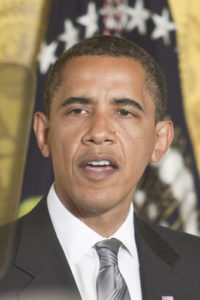
President Obama will request fiscal 2012 funding for an educational technology agency within the U.S. Department of Education (ED) that would bring resources and funding to schools and colleges, while some ed-tech advocates warn that the government’s support might not reach teachers and professors.
The White House announced Feb. 7 that its requests for the 2012 federal budget would include an agency called Advanced Research Projects Agency – Education, which would “support research on breakthrough technologies to enhance learning.”
The White House’s announcement was short on specifics, but it said the new agency would advocate for technology such as “software that is as effective as a personal tutor.”
The educational technology push comes three weeks after Obama said in his State of the Union address that America would “need to out-innovate, out-educate, and out-build the rest of the world” to keep pace with the global economy.
The effort to create the ed-tech agency, along with a $2 billion grant program funding sharable web-based educational tools, has grabbed the attention of online education advocates.
But there remains skepticism that funding provided by a new ED agency would find its way to educators who can design workable ways to make high-quality educational technology available for students.
“Any time there is a lot of money with the intent to go in a new direction, far too often, the only experts available are the old guard,” said Charles Severance, a faculty member at the University of Michigan’s School of Information and a developer network coordinator for the IMS Global Learning Consortium, which produces technology standards for education. “And they quickly line up to gain control of the new funds before innovators even know that there is an opportunity.”
Severance said federal officials in charge of the ed-tech agency would have to make a concerted effort to include K-12 and college educators, who “work like dogs from September to June” with little or no free time to apply for federal funding for special projects.
“There is a massive disconnect between education experts and people who actually educate,” he said. “If you look at a lot of the emerging educational technology trends conferences, all the speakers and leadership are non-teachers.”
Severance continued: “I would hope that this new agency would realize these problems and do something about them. But it is not likely.”
Higher-education technology experts said any educational technology program run by ED should draw scrutiny from potential grant applicants and innovators.
Melora Sundt, associate dean at the University of Southern California’s Rossier School of Education, who tracks trends in distance education, said that in her days of applying for federal grants, she was surprised that the government required proposals in WordPerfect format, by then a long-outdated standard.
“The federal government is usually the last place one finds tech advances in the day-to-day organization,” she said.
Sundt said an ED agency focusing on educational technology could get more educators involved in creating online learning material, because startup costs for program development can be steep.
“These kinds of innovations can be expensive in the early stages, and those costs can cut out participation by schools,” she said. “Some of the innovation will happen with or without government support, but the research about how well these things work won’t happen without the support, nor will wider adoption.”
Despite his reservations about a new ED agency, Severance said Obama’s budget proposal would have played an important role in the early-to-mid 2000s, when online learning was gaining traction.
“At some level … this agency is a tremendous development and way overdue,” he said.
- Research: Social media has negative impact on academic performance - April 2, 2020
- Number 1: Social media has negative impact on academic performance - December 31, 2014
- 6 reasons campus networks must change - September 30, 2014

Comments are closed.